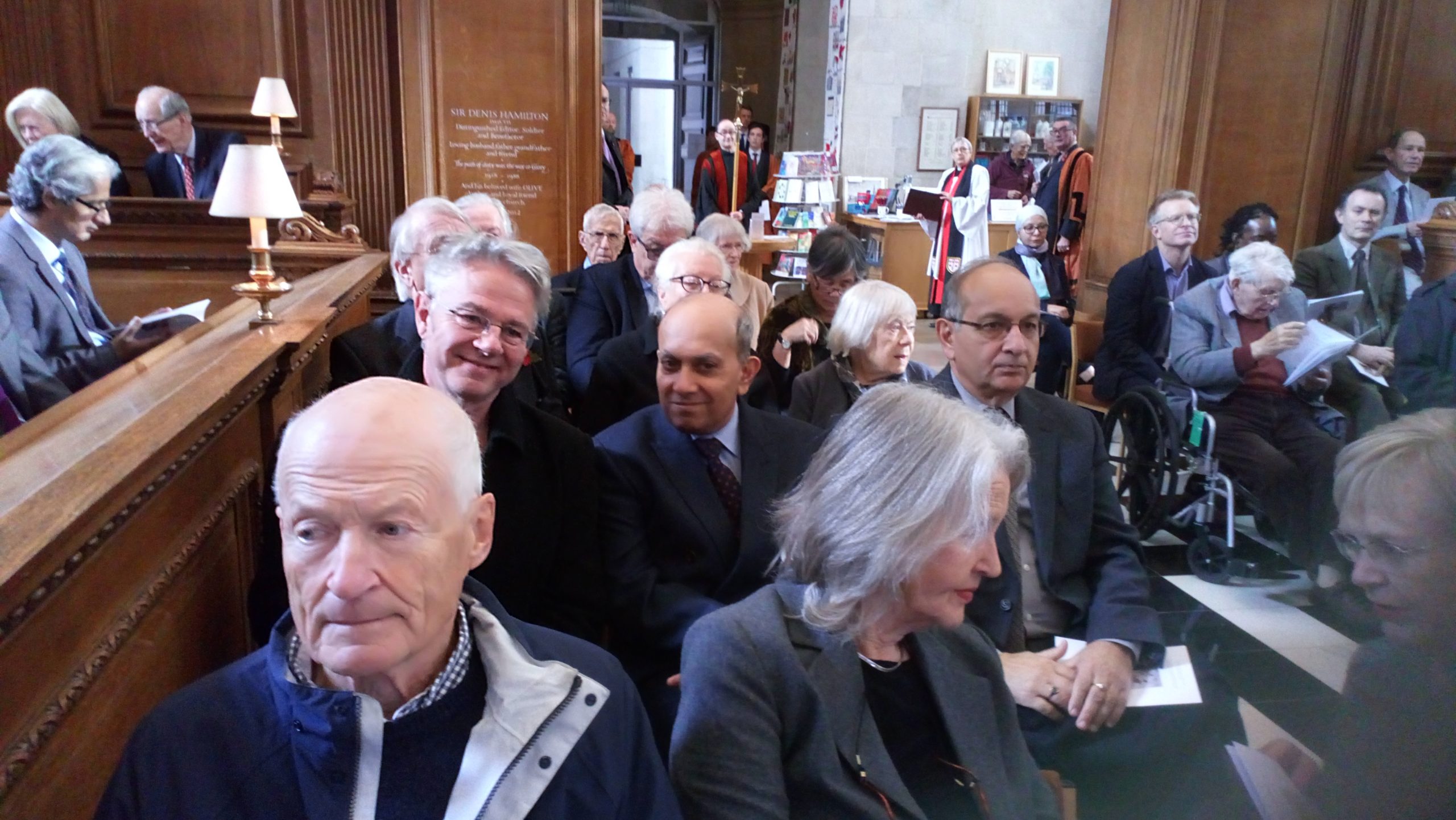 Journalists, former Commonwealth officials and members of The Round Table Editorial Board attended a memorial service for Derek Ingram
Journalists, former Commonwealth officials and members of The Round Table Editorial Board attended a memorial service for Derek Ingram
A Service of Thanksgiving for Derek Ingram was held on 8 November at St Bride’s Church, off Fleet Street in London. Derek Ingram, who died in June of this year, was a founding member of the Commonwealth Journalists Association (CJA), the writer of The Round Table’s Commonwealth Update for many years and a member of the Round Table’s editorial board.
Channel 4’s International Editor, Lindsey Hilsum, had worked with Gemini News Service which Derek co-founded. She delivered one of the addresses at the service. Her address at the memorial service is reproduced here:
The other day I went round to Derek’s mews house to see how Nick, his godson, was getting along with sorting through his stuff. Oh dear. Derek was a squirrel. I wonder if he ever threw anything away. There were books, of course. And postcards. And theatre programmes – he loved the theatre. Posters from his visit to Mao’s China in 1972. And above all, newspapers. A first edition of the Sunday Times from 1822 that he must have bought from another collector. The News Chronicle and Picture Post from VE Day which I presume he bought on the street the very day they came out. There were piles of notebooks in which, as a teenager, in neat fountain pen, he had summarised what happened every day of World War Two, illustrated with photos cut out of the papers. Nick told me that, during the war, they tried to evacuate Derek from London to Westward Ho in Devon, but he only lasted a few days because he couldn’t find a newspaper – so he put himself on the train and headed back to London where you might get bombed but at least you could find out what was going on.
Derek never wanted to anything but be a journalist. And that was what he was, to the very depths of his being and all his life.
Derek started his career in 1942, aged 17, on the Daily Sketch, and after a year in the Royal Navy – oh yes, we found his signalman’s notes and a key to enseigns in a box in his house – he joined the Daily Express. From there he went onto the Daily Mail where he rose to become Deputy Editor, and he might well have become Editor, but his principles got in the way. One Sunday, Lord Rothermere handed Derek an editorial he had written supporting Ian Smith, the Rhodesian Prime Minister, who had declared UDI, Universal Declaration of Independence so the white minority could continue to hold power. Derek was naturally shy, but this was too much. “You can’t say that!” he said. He was a great believer in anti-racism and democracy and independence for African countries. It was 1966. There was no going back. He refused Rothermere’s offer of a job in personnel – I mean, really – and left to found what became his life’s work: Gemini News.
Gemini was ahead of its time in that it was an exchange between developing countries. A newspaper in, say, Tanzania, would subscribe and get stories plus graphics and maps from reporters in, say, Malaysia, India, Peru and beyond. Derek gave young reporters a chance when others didn’t. I was lucky enough to be one of them. I can still remember the thrill of opening my copy of the Standard in Nairobi and seeing my own byline next to the words “Gemini News Service.” It seems quaint now, but the bundle of stories was sent out twice a week – by post. So we weren’t reporting hot news but longer-term more reflective stories. It gave an opportunity to many African, Asian and Latin American journalists who later became important media figures in their own countries.
Derek’s friend, Oliver Carruthers, funded Gemini but the economics of it never quite worked. Reporters didn’t get paid much. If we asked for more, Derek would squeak – he had a way of half squeaking, half barking – that no-one else was asking. Daniel Nelson, who eventually took over as Editor, remembers coming across a pile of letters from impoverished journalists asking for more money, all of whom had, presumably, been told they were the only one being so demanding.
Derek’s other great love was, of course – as we have heard – the Commonwealth. His friendships with great Commonwealth leaders are legendary. His copy of Kenneth Kaunda’s memoirs is personally inscribed. Leaders trusted him and sought his counsel. In that way, he was he was more than a journalist.
To the end of his days, Derek would get the newspapers every day. And I am honoured that until almost the last week of his life, he would watch Channel 4 News at 7 o’clock every night, glass of wine in hand. He was, I’m told, especially pleased if I was on. That makes me want to cry. I’m happy if, as one of his many protegés from Gemini News, I made him proud.
What a long great life the consummate newspaperman and journalist Derek Ingram led. What a good death he had. How right it feels to celebrate him here at St Brides, the journalists’ church.
Related articles:
Gemini’s news legacy and development journalism – Round Table



